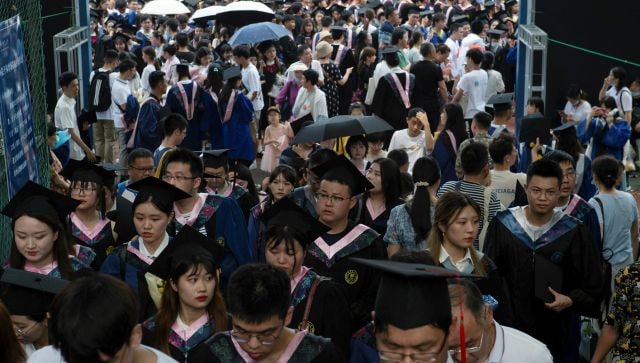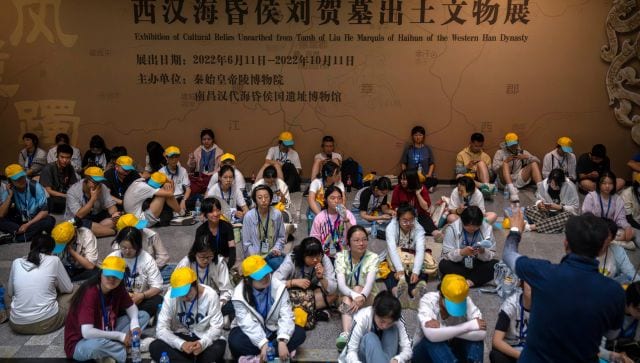China banned after-school private tutoring two years ago with the aim to lessen the academic burden and encourage social equality. In July 2021, China put a stop to private tuition over weekends and holidays for students below 16. Later in September, it banned private tutors from giving classes online or in unregistered venues such as residential buildings or hotels, etc. However, it seems the Asian country’s move has fallen flat on its face. Ever since China launched a crackdown on its private tuition sector, parents as well as tutors have found a way to circumvent the rules. Let’s take a closer look. China’s competitive education system As per CNA, the policy, called shuang jian, or double reduction, was meant to ease pressure on parents and children overwhelmed by the country’s notoriously competitive education system. Speaking to Australia’s SBS News, Professor emeritus Anthony Welch, who specialises in national and international education policy at the University of Sydney, pointed out that Chinese society revolves around a “test culture” where a “poor score will condemn you to a very limited future”. China’s college entrance exam, known as gaokao, is highly competitive. The grades scored in the senior high school entrance examination or Zhongkao determine if students can continue academics or join a vocational school in the country, as per the CNA report. [caption id=“attachment_12899062” align=“alignnone” width=“640”] China has a notoriously competitive education system. Reuters (Representational Image)[/caption] But due to the stigma attached to the vocational schools, which teach technical skills for employment, anxiety about getting good grades remains intense among parents and children, the report added. “If a child enters high school, even if it isn’t an elite one, there’d be a good learning environment. But if (children) enter vocational institutions, they’d basically stop learning,” Yuan Mei, a parent who did not give her real name, told CNA. China’s private tutoring sector Private tutoring started gaining prominence in
China
in the early 1990s, as per SBS News. Before the ban, this industry was worth an estimated 2 trillion yuan ($310 billion then). Playing on the anxiety of parents to make their children successful, private tutoring centres raked in major profits for years. According to Hou Yuxin, who was in the private education sector, “They played on people’s fear of getting left behind”, reported CNA. After the restrictions, no new licences were issued for academic tuition centres, while the existing companies were forced to register as non-profits or cease operations. Private tutoring goes underground Despite the ban, several tutoring firms have continued to operate in secret. As per a Bloomberg report, parents have turned to costly, underground tuition services for their kids. Those dissatisfied with the quality of education imparted at schools are now shelling out much more than they paid for private academic classes before.
China has a notoriously competitive education system. Reuters (Representational Image)[/caption] But due to the stigma attached to the vocational schools, which teach technical skills for employment, anxiety about getting good grades remains intense among parents and children, the report added. “If a child enters high school, even if it isn’t an elite one, there’d be a good learning environment. But if (children) enter vocational institutions, they’d basically stop learning,” Yuan Mei, a parent who did not give her real name, told CNA. China’s private tutoring sector Private tutoring started gaining prominence in
China
in the early 1990s, as per SBS News. Before the ban, this industry was worth an estimated 2 trillion yuan ($310 billion then). Playing on the anxiety of parents to make their children successful, private tutoring centres raked in major profits for years. According to Hou Yuxin, who was in the private education sector, “They played on people’s fear of getting left behind”, reported CNA. After the restrictions, no new licences were issued for academic tuition centres, while the existing companies were forced to register as non-profits or cease operations. Private tutoring goes underground Despite the ban, several tutoring firms have continued to operate in secret. As per a Bloomberg report, parents have turned to costly, underground tuition services for their kids. Those dissatisfied with the quality of education imparted at schools are now shelling out much more than they paid for private academic classes before.
It is mostly wealthy, well-connected families that can afford these illegal classes, giving a head start to their children in education.
Previously, private tutors used to teach a large number of students together in classes run by major education firms. Now they teach smaller groups, mostly one on one, leading to a rise in such classes. As Bloomberg noted, many tutors are demanding higher fees to make up for the loss of students. In cities like Beijing and Shanghai, the fees have climbed to as much as 3,000 yuan (US$430) an hour, reported CNA. As per Sixth Tone’s article in July 2022, a parent in Beijing, who used to pay over 20,000 yuan a year to her daughter’s English tutoring center, has to now give double for the three-on-one private classes. “When you make a law that mainly affects upper-middle-class families, they will find a way to get around the law,” Hua-Yu Sebastian Cherng, an associate professor at New York University who researches China’s education system, told Sixth Tone last year. “These are the families that are the most resourced and they have the most knowledge about how to do things in China.” Speaking to Bloomberg, Sarah Wang, a 40-year-old mother who works at an e-commerce company in Shanghai, said she now spends 50 per cent more than before on in-person tuition classes for her child who is in fifth grade. “Our burden has not been reduced at all”, she lamented. [caption id=“attachment_12899102” align=“alignnone” width=“640”] China’s ‘double reduction’ policy to curb academic stress and promote social equality seems to have backfired. AP (Representational Image of students in China)[/caption] “Double reduction affects ordinary families the most. Rich families will always be able to find other ways,” Gong Erkang, a video editor and parent, told CNA. While there are some affordable large-scale
online
tuition classes, they are not popular among middle-class parents, who believe they do not provide proper guidance, reported Bloomberg. Meanwhile, ahead of the second anniversary of the double reduction policy, local authorities in Hefei, the capital city of the eastern Anhui province, launched 77 raids on private education institutions, as per a report by the Chinese newspaper People’s Daily in late June. The south-eastern province of Fujian and Jiangsu, a wealthy coastal province bordering Shanghai, also witnessed similar crackdowns recently. However, despite the restrictions and crackdowns, as a parent told CNA, “Everyone’s secretly sending their children to tuition”. With inputs from agencies
China’s ‘double reduction’ policy to curb academic stress and promote social equality seems to have backfired. AP (Representational Image of students in China)[/caption] “Double reduction affects ordinary families the most. Rich families will always be able to find other ways,” Gong Erkang, a video editor and parent, told CNA. While there are some affordable large-scale
online
tuition classes, they are not popular among middle-class parents, who believe they do not provide proper guidance, reported Bloomberg. Meanwhile, ahead of the second anniversary of the double reduction policy, local authorities in Hefei, the capital city of the eastern Anhui province, launched 77 raids on private education institutions, as per a report by the Chinese newspaper People’s Daily in late June. The south-eastern province of Fujian and Jiangsu, a wealthy coastal province bordering Shanghai, also witnessed similar crackdowns recently. However, despite the restrictions and crackdowns, as a parent told CNA, “Everyone’s secretly sending their children to tuition”. With inputs from agencies
)